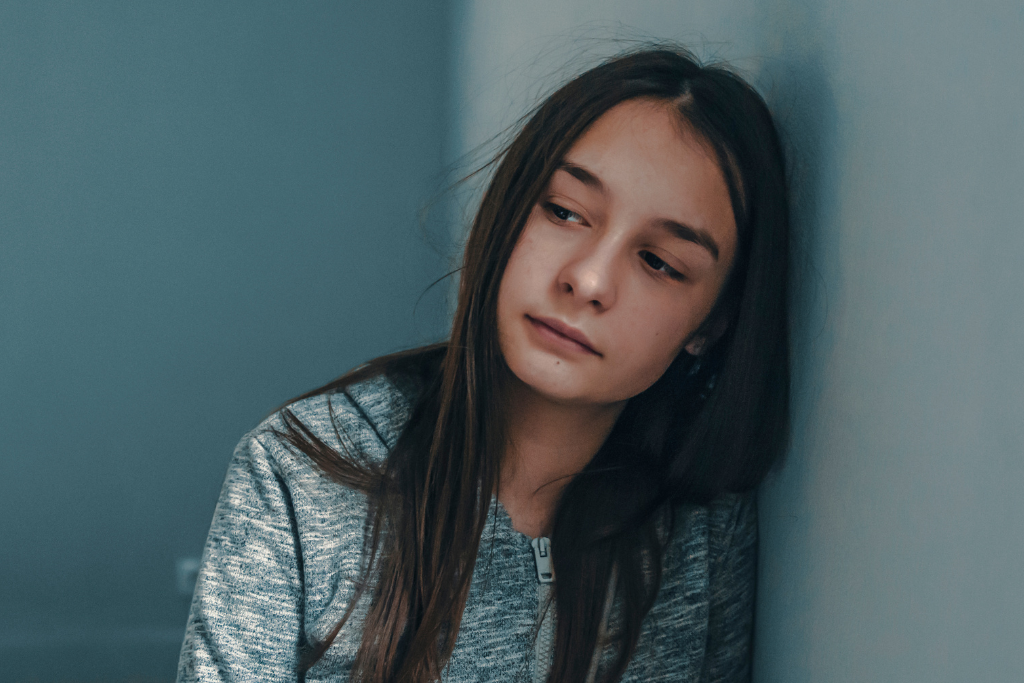Anxiety happens when you're nervous, uneasy, or worried for an extended period of time. The same happens for adolescents when they lack anxiety coping skills for teens.
It's normal to be anxious, and everyone feels that all the time. But if you are struggling in your day-to-day life or can no longer do anything because you're always afraid, that's anxiety and it's not healthy. If it starts to interfere with your school work, relationships or family life and prevents you from being in the present moment, it becomes clinical anxiety.
When you're anxious, the nervous system is often in a fight, flight, or freeze state. It does so due to several stressors. These stressors may be sensory, environmental, or emotional. One's experiences may also cause unhealthy emotional states and physical unease. Physical symptoms become evident, such as difficulty focusing, sleeping, or even physical pain.
Teens are most prone to anxiety because of the physical transformations associated with adolescence. They are also subjected to stressful situations in school, not to mention having to go through all those awkward social interactions. Middle school and high school are anxiety-inducing because it is also the time when teens experience heartbreaks, peer pressure, and insecurities. They also start to fear that they won't get good grades in school and what that means for their future.
Types of Anxiety Disorder
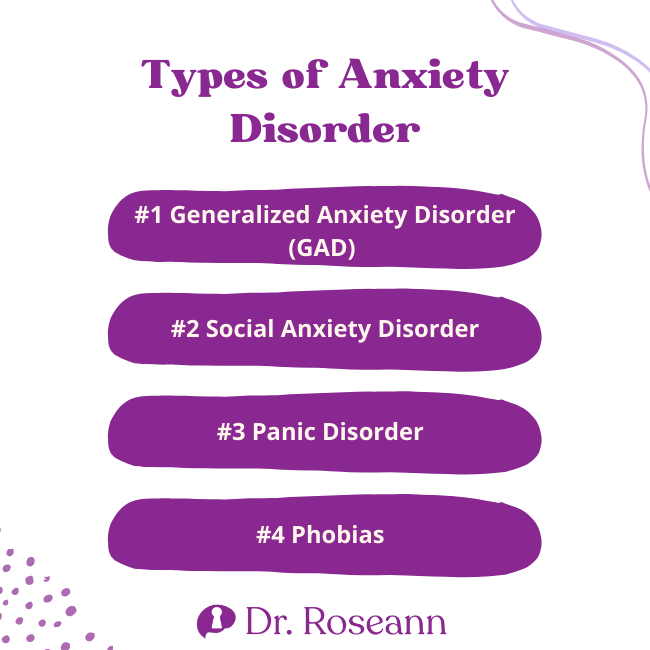
Anxiety disorders in children, teens, and young adults may come in different types. Children as young as six years old may develop anxiety, which is why it is important to diagnose the disorder early. If you suspect that your teen has it, seek help. That way, they can get emotional support and their condition can be managed before they enter their teenage years.
Defining Teen Anxiety
Anxiety in teens often goes beyond the typical stresses of adolescence. It's crucial to distinguish between common teenage worries and anxiety disorders. Anxiety disorders involve more intense, persistent, and disruptive worry or fear that can significantly impact daily functioning. Recognizing these signs is the first step in managing teen anxiety effectively.
The different types of anxiety disorders are:
#1 Generalized Anxiety Disorder (GAD)
A teen with generalized anxiety disorder suffers from excessive and persistent worrying about a lot of things. It is difficult for teens with GAD to control or address their worries. These teens may worry about the same thing for over six months and exhibit three or more anxiety symptoms.
#2 Social Anxiety Disorder
Teens with social anxiety disorder avoid being in situations where they can get judged, scrutinized, or evaluated by others. As such, they fear doing things where they have to with other people and can't handle social pressure well. Their feelings of anxiety roots in the fear of being rejected or humiliated. Many with school anxiety often have social anxiety.
#3 Panic Disorder
Panic attacks are sudden waves of fear of losing control regardless if there's a trigger or clear danger. It's the body's response to fear. Teens with panic disorders experience unexpected and frequent panic attacks. The attack may occur at any time and combine with physical symptoms such as tingling, trembling, chest pain, and a fast heart rate, among others.
#4 Phobias
Phobias cause a person to experience extreme and irrational fear about a certain object, place, living creature, or situation. This exaggerated fear forces the person to modify their life to avoid whatever it is they are fearful of. When subjected to their phobia, the person will go through intense distress that prevents them from acting normally.
Signs and Symptoms of Anxiety in Teens
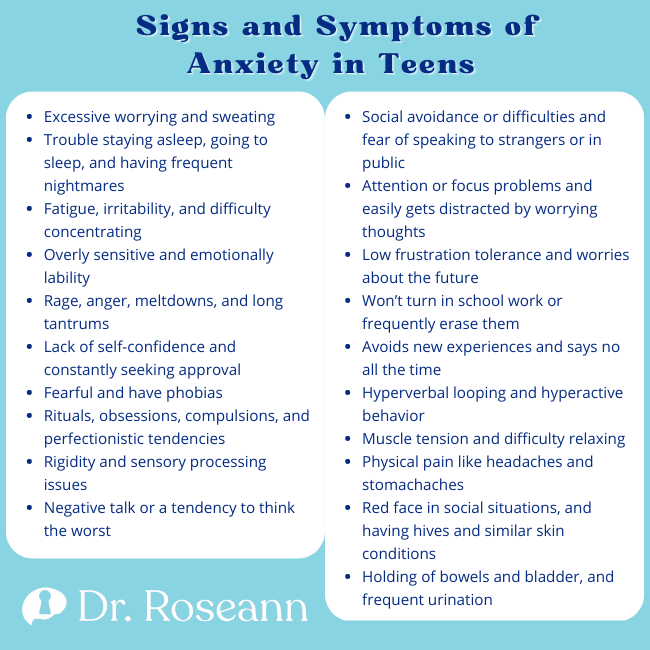
- Excessive worrying and sweating
- Trouble staying asleep, going to sleep, and having frequent nightmares
- Fatigue, irritability, and difficulty concentrating
- Overly sensitive and emotional lability
- Rage, anger, meltdowns, and long tantrums
- Lack of self-confidence and constantly seeking approval
- Fearful and have phobias
- Perfectionistic tendencies
- Rigidity and sensory processing issues
- Negative talk or a tendency to think the worst
- Social avoidance or difficulties and fear of speaking to strangers or in public
- Attention or focus problems and easily gets distracted by worrying thoughts
- Low frustration tolerance and worries about the future
- Won't turn in school work or frequently erase them
- Avoids new experiences and says no all the time
- Hyperverbal looping and hyperactive behavior
- Muscle tension and difficulty relaxing
- Physical pain like headaches and stomachaches
- Red face in social situations, and having hives and similar skin conditions
- Holding of bowels and bladder, and frequent urination
Essential Skills to Cope with Anxiety in Teens
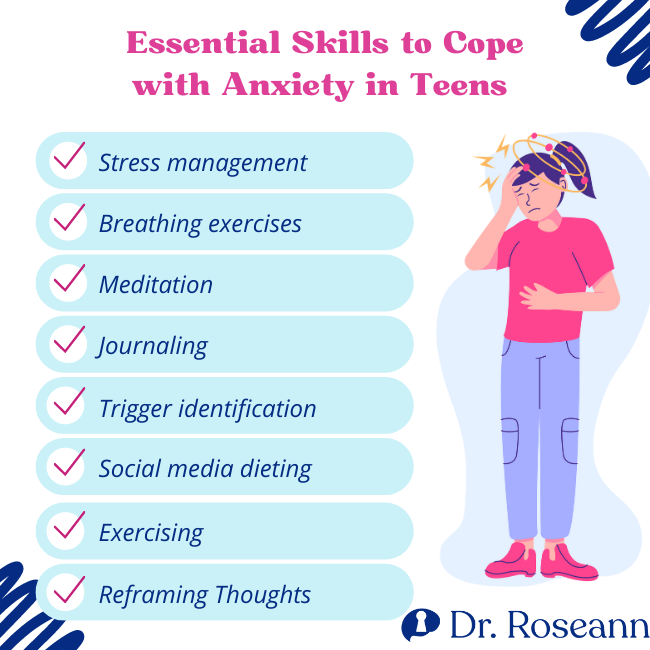
Teens need support for their anxiety. Oftentimes, teens with an anxiety disorder can't easily change their situation and get better. It's because they don't choose to feel or act anxiously. There's something inside them that triggers the condition.
This is why they need solutions and a lot of healthy coping skills. When anxiety disorder is ignored it may get worse and become a problem they'll have to deal with until adulthood. Treating anxiety in adolescence can be layered and complex because anxiety has often been a longstanding issue.
Anxiety coping mechanisms are strategies or practices that individuals use to manage or reduce anxiety. When it comes to coping skills for high school students, this can include a variety of approaches.
Here are some coping techniques that can help them tremendously.
1. Stress management
Managing stress is a skill every person with anxiety disorder should learn. Parents should be role models when it comes to handling stress. Show your children how to overcome their troubles and work through stressful events or situations.
If teens see how steadfast and efficient their parents are in managing stress, they will likely model their strengths and develop a better stress response. Start by initiating lifestyle changes to help ease your teen's anxiety.
Find simple ways for your teen, such as adding magnesium, to see the positive side of what they're being anxious about. Always practice self-care. Remember that self-care is not a luxury but a necessity for mental health. For example, you can ask your child with you to join you in a yoga session to help ease their teen stress.
2. Breathing exercises
When your teen is anxious, they often can't breathe well. Tell them to make that conscious effort to breathe in and out whenever they feel anxious. Learning some breathing exercises can help a lot. Teach them to look for a comfortable spot where they can take deep breaths by inhaling through their nose and exhaling through the mouth.
3. Meditation
Meditation is a helpful way to address anxiety as it effectively calms the mind. Breathwork and meditation come hand in hand, and it's easy to practice them anytime and anywhere. It's best to meditate in a quiet and peaceful environment if you're just starting out. But once you get the hang of it, you can meditate almost anywhere.
Meditation consists of deep breathing, paying attention to your mind and body, and choosing a word to say repeatedly in your mind. Try not to think of anything else while meditating. With practice, you'll be more focused and you'll find its positive effect on anxiety. Start by listening to a song that calms you down. Spending time with nature can be a form of meditation too.
4. Journaling
Many teens with anxiety say that writing about the things that they're anxious about is a great way to ease their minds and address difficult emotions. Invite your struggling teen to write down their feelings and thoughts in a journal. Writing is therapeutic and can help clear the mind.
If your teen has ongoing anxiety, make journaling a routine for them. It's a great idea to set aside a few minutes each day to write about their stressors and worries. They can also write about their goals and dreams as well. All these will help shift their thinking.
One study explored the effect of journaling on people with anxiety. It concluded that positive affect journaling is an effective intervention to mitigate mental distress, increase well-being, and enhance physical functioning. It can be integrated into the patient's routine medical care to improve their quality of life (Smyth et al., 2018).
5. Trigger identification
Identify the triggers of your teen's anxiety and talk about them. Let them realize that whatever they're worried about may not necessarily happen. You may also try exposure therapy with a therapist for your teen to train their mind and understand what they are being anxious about.
During exposure therapy, a psychologist will create a safe place to expose your teen to the things they fear or are anxious about. By exposing them to their fears in a safe space, they can reduce their anxiety and avoidance of the matter (American Psychological Association, 2017).
6. Social media diet
Every teen has a social media account and completely cutting them off from the internet feels cruel. But you can always set boundaries on their usage. For example, enforce some rules like they can't check their phones or social media accounts after 10 pm.
You should also ask your teen to remove, mute, or unfollow accounts that make them anxious and add more things that inspire them or make them happy. While this isn't asking your teen to close all their social media accounts, regulating its use can help so much in addressing their anxiety symptoms.
7. Exercising
There are a lot of benefits to exercising. Moving your body helps release endorphins, which aids in combating depression, anxiety, and other mental health problems. If your teen can join sports teams and group activities, that's even better. They'll get more support from their teammates or good friends while doing a physical activity that they enjoy.
8. Reframing Thoughts
Our thoughts contain power. However, teens with anxiety may find it difficult to change their thoughts. It's not easy to think positively when you feel the whole world is crumbling around you. Sometimes, a simple pep talk won't cut it.
The better way to address anxiety is to recognize anxious thoughts as they come. That's when you encourage your teen of the power they have to challenge and change their thoughts. Flipping that internal script is important. Knowing what triggers them allows them to come up with health strategies on how to avoid them, such as positive self-talk.
Tailored Coping Mechanisms and Strategies for Teen Anxiety
Navigating the complexities of adolescence can be challenging, especially for teens grappling with anxiety. In this critical phase of growth and development, anxiety can manifest in various forms, from generalized worry to social anxiety and panic attacks.
Understanding and effectively managing this anxiety is crucial, not only for the well-being of teenagers but also for their transition into healthy, balanced adults. Having good coping skills for anxiety and stress can help your teen with anxiey.
Enhanced Coping Techniques for Various Types of Anxiety
-
Targeted Strategies for Different Anxiety Disorders: Developing specialized coping strategies for different types of anxiety, such as specific relaxation techniques for GAD, exposure techniques for phobias, and social skills training for social anxiety.
-
Mindfulness and Meditation Tailored for Teens: Guiding teens through age-appropriate mindfulness and meditation exercises that are engaging and relevant to their experiences, such as guided visualizations focused on common teen stressors.
-
Empowering Teens through Knowledge: Education about anxiety and its effects on the body and mind can be empowering for teens. Understanding what anxiety is and how it manifests can demystify the experience and make coping strategies more effective.
Interactive and Engaging Activities
-
Anxiety Management Workshops: Organizing workshops or group sessions where teens can learn and practice coping skills in a supportive environment, including role-playing, stress management games, and peer discussions. Online support groups can also help parents as well.
-
Creative Arts Therapies: Using art, drama, or music therapy as a medium for teens to express their feelings and learn coping skills in a non-verbal and creative way. These activities for teens with anxiety can also bring some creative fun into their life.
-
Technology-Assisted Coping Tools: Introducing apps and online resources specifically designed for teens to manage anxiety, such as mindfulness apps, online journals, or virtual support groups.
Supportive Practices for Home and School
-
Family Involvement in Coping Strategies: Encouraging family members to participate in certain coping strategies with their teens, such as joint relaxation techniques, family meditation sessions, or attending therapy together. Working on co-regulation is important as well so you can share your calm.
-
School-Based Support Systems: Implementing school-based programs that teach coping skills, offer peer support groups, and provide resources for students struggling with anxiety.
-
Routine and Structure for Anxiety Management: Helping teens establish a daily routine that includes time for relaxation, essential oils, exercise, diet, supplements, magnesium and engaging in hobbies, which can provide a sense of control and predictability.
Advanced Techniques for Severe Cases
-
Cognitive Behavioral Techniques for Anxiety: Teaching cognitive restructuring and problem-solving skills to help teens challenge and change negative thought patterns related to anxiety.
-
Exposure Therapy for Specific Phobias and Social Anxiety: Under professional guidance, gradually exposing teens to their fears in a controlled and supportive way, helping them build confidence and reduce avoidance behaviors.
-
Panic Attack Management Skills: Providing specific strategies for dealing with panic attacks, such as grounding techniques, controlled breathing exercises, and developing a panic attack ‘action plan.'
Integrating these coping mechanisms and strategies into the lives of teens with anxiety can significantly improve their ability to manage their symptoms and enhance their overall well-being. The goal is to provide a comprehensive toolkit that teens can draw from, depending on their individual needs and the specific challenges they face with anxiety.
Solutions for Teens with Anxiety
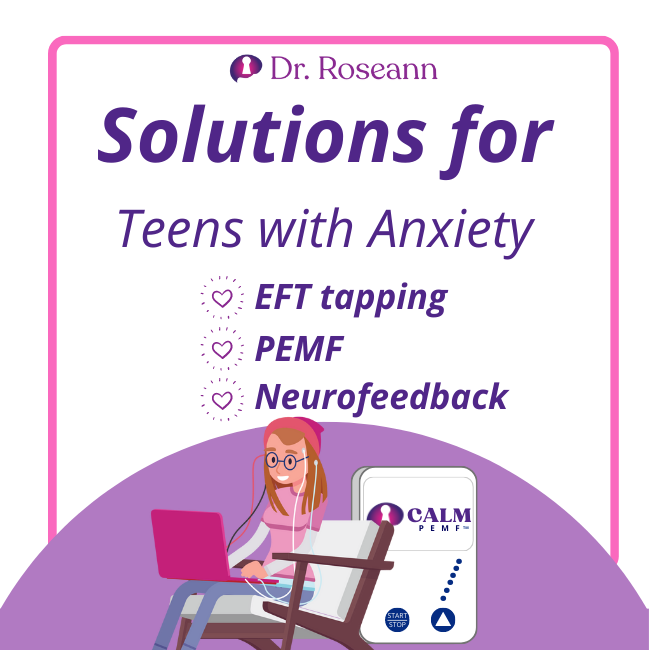
Teens with an anxiety disorder tend to focus on their worries and fears all the time and cease to be productive. If not managed properly, their fear may soon become very irrational, and they may even succumb to their negative thoughts.
Aside from having a list of coping skills, consulting with healthcare professionals and primary care providers can help a lot. They can provide treatments like family therapy and cognitive behavioral therapy. The most important thing for your teen right now is to find a healthy way to reduce their negative self-talk and restore their good mental health.
To help reduce the effect of anxiety, EFT tapping may help relieve anxious thoughts. One study has proven that EFT produces positive health effects and improves the mental well-being of people suffering from anxiety, and depression (Bach et al., 2019).
For teens diagnosed with clinical anxiety, the primary solutions include PEMF and neurofeedback to effectively reduce the symptoms and calm the brain. Both treatments are backed by science to create favorable results for children and teens.
One study aimed to investigate how PEMF or pulsed electromagnetic field therapy affects people suffering from anxiety, post-traumatic stress syndrome, and panic disorders. The study concluded that PEMF is a viable alternative therapy to stimulate the brain as it initiates several physiologic actions which can alleviate these conditions (Pawluk, 2019).
Neurofeedback was tested on patients with anxiety and after 30 sessions in a span of three months, a significant decrease in the symptoms of anxiety was observed. After a year, their clinical scales were within normal and eventually became symptom-free. These findings prove how neurofeedback can be an effective solution for anxiety disorders (Moradi et al., 2011).
Helping Your Teen Cope with Anxiety
Adolescence is a pivotal time in life, and for teens dealing with anxiety, it can be particularly challenging. Anxiety in teenagers can manifest in various ways, from social anxiety to more generalized forms of anxiety disorder. As parents, caregivers, or educators, understanding how to help a teenager with anxiety disorder is critical for their mental and emotional well-being.
Communication is Key
Open and honest communication is crucial. Encourage your teen to express their feelings and worries. Listen without judgment and validate their emotions. This supportive environment allows teens to feel safe and understood.
Building a Supportive Environment
Creating a calm and stress-free home environment can significantly reduce anxiety triggers. This includes maintaining a routine, minimizing chaos, and ensuring a quiet space where your teen can relax and recharge.
Encouraging Professional Help
If anxiety disrupts your teen's daily life, seeking professional help is important. A therapist specializing in adolescent anxiety can provide guidance and coping strategies tailored to your teen's needs.
Empowering Teens Through Knowledge
Educate yourself and your teen about anxiety. Understanding what anxiety is, how it manifests, and its effects can demystify the experience. This knowledge empowers teens, making coping strategies more effective.
Practical Support Strategies
Offer practical support by helping your teen establish a daily routine, encouraging healthy lifestyle choices like proper diet and exercise, and being a role model in managing stress and anxiety.
Collaborative Problem-Solving
Work together with your teen to identify triggers and develop coping strategies. This collaboration fosters a sense of control and helps your teen feel more equipped to manage their anxiety.
Most parents feel helpless in “how to help my teen with anxiety,” but it always is a combination of calming the brain and teaching your teen coping skills.
Managing teen anxiety is a joint effort involving understanding, support, and appropriate strategies. By providing a supportive environment and encouraging professional help when needed, you can empower your teen to navigate and cope with their anxiety more effectively. Every parent has this ability when they have the right guidance and tools.
Citations
American Psychological Association. (2017). What Is Exposure Therapy? Https://Www.apa.org. https://www.apa.org/ptsd-guideline/patients-and-families/exposure-therapy
Bach, D., Groesbeck, G., Stapleton, P., Sims, R., Blickheuser, K., & Church, D. (2019). Clinical EFT (Emotional Freedom Techniques) Improves Multiple Physiological Markers of Health. Journal of Evidence-Based Integrative Medicine, 24(24), 2515690X18823691. https://doi.org/10.1177/2515690X18823691
Moradi, A., Pouladi, F., Pishva, N., Rezaei, B., Torshabi, M., & Mehrjerdi, Z. A. (2011). Treatment of Anxiety Disorder with Neurofeedback: Case Study. Procedia – Social and Behavioral Sciences, 30, 103–107. https://doi.org/10.1016/j.sbspro.2011.10.021
Pawluk, W. (2019). Pulsed Magnetic Field Treatment of Anxiety, Panic and Post-Traumatic Stress Disorders. Journal of Alternative, Complementary & Integrative Medicine, 5(3), 1–8. https://doi.org/10.24966/acim-7562/100075
Smyth, J. M., Johnson, J. A., Auer, B. J., Lehman, E., Talamo, G., & Sciamanna, C. N. (2018). Online Positive Affect Journaling in the Improvement of Mental Distress and Well-Being in General Medical Patients With Elevated Anxiety Symptoms: A Preliminary Randomized Controlled Trial. JMIR Mental Health, 5(4), e11290. https://doi.org/10.2196/11290
Always remember… “Calm Brain, Happy Family™”
Are you looking for SOLUTIONS for your struggling child or teen?
Dr. Roseann and her team are all about solutions, so you are in the right place!
There are 3 ways to work with Dr. Roseann:
You can get her books for parents and professionals, including: It’s Gonna Be OK™: Proven Ways to Improve Your Child’s Mental Health, Teletherapy Toolkit™ and Brain Under Attack: A Resource For Parents and Caregivers of Children With PANS, PANDAS, and Autoimmune Encephalopathy.
If you are a business or organization that needs proactive guidance to support employee mental health or an organization looking for a brand representative, check out Dr. Roseann’s media page and professional speaking page to see how we can work together.
Dr. Roseann is a Children’s Mental Health Expert and Licensed Therapist who has been featured in/on hundreds of media outlets including The Mel Robbins Show, CBS, NBC, PIX11 NYC, Today, FORBES, CNN, The New York Times, The Washington Post, Business Insider, Women’s Day, Healthline, CNET, Parade Magazine and PARENTS. FORBES called her, “A thought leader in children’s mental health.”

She coined the terms, “Re-entry panic syndrome” and “eco-anxiety” and is a frequent contributor to media on mental health.
Dr. Roseann Capanna-Hodge has three decades of experience in working with children, teens and their families with attention-deficit hyperactivity disorder (ADHD), autism, concussion, dyslexia and learning disability, anxiety, Obsessive Compulsive Disorder (OCD), depression and mood disorder, Lyme Disease, and PANS/PANDAS using science-backed natural mental health solutions such as supplements, magnesium, nutrition, QEEG Brain maps, neurofeedback, PEMF, psychotherapy and other non-medication approaches.
She is the author of three bestselling books, It’s Gonna Be OK!: Proven Ways to Improve Your Child's Mental Health, The Teletherapy Toolkit, and Brain Under Attack. Dr. Roseann is known for offering a message of hope through science-endorsed methods that promote a calm brain.
Her trademarked BrainBehaviorResetⓇ Program and It’s Gonna be OK!Ⓡ Podcast has been a cornerstone for thousands of parents facing mental health, behavioral or neurodevelopmental challenges.
She is the founder and director of The Global Institute of Children’s Mental Health, Neurotastic™Brain Formulas and Dr. Roseann Capanna-Hodge, LLC. Dr. Roseann is a Board Certified Neurofeedback (BCN) Practitioner, a Board Member of the Northeast Region Biofeedback Society (NRBS), Certified Integrative Mental Health Professional (CIMHP) and an Amen Clinic Certified Brain Health Coach. She is also a member of The International Lyme Disease and Associated Disease Society (ILADS), The American Psychological Association (APA), Anxiety and Depression Association of America (ADAA) National Association of School Psychologists (NASP), International OCD Foundation (IOCDF).
© Roseann-Capanna-Hodge, LLC 2023
Disclaimer: This article is not intended to give health advice and it is recommended to consult with a physician before beginning any new wellness regime. *The effectiveness of diagnosis and treatment vary by patient and condition. Dr. Roseann Capanna-Hodge, LLC does not guarantee certain results.

